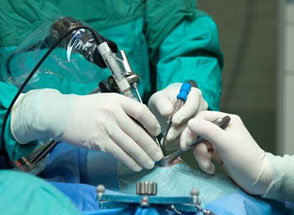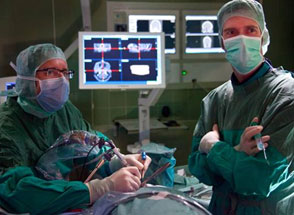Neurosurgical Therapy
In our clinic a variety of minimally invasive endonasal procedures are conducted each year to treat tumors in the pituitary region. The responsible surgical team has developed its own special minimally invasive endoscopic access to this region, which has a high radical nature and allows at the same time maximum tissue protection - especially of the nose. In concrete terms, this means that in 92-94% * a radical tumor resection can be achieved. With correspondingly low complication rates: Postoperative sellar bleeding occurred in 0.4% of cases, meningitis in 1%, a perforation of the nasal septum in 0.4%, temporary smell disorders in 7.9% and impairment of nasal breathing in 9.9% *.


Images from the operating room during an endoscopic endonasal pituitary surgery
The pituitary tumor is usually only separated by a thin layer of the meninges (the so-called diaphragm sellae) from the cerebrospinal fluid space. For large tumors and thin meninges a seal of meninges layer may therefore be necessary during surgery. For this reason, in a small percentage of cases, through a small incision in the navel some fat is removed from the patient as a graft for sealing. But also other methods are used for this purpose. Overall the occurrence of postoperative CSF leaks after endonasal surgery - due to our preferred strategy - could be limited to a minimum amount of 2% *.
During therapy of pituitary tumors the interdisciplinary treatment with ophthalmologists and endocrinologists is very important to our team. You will find such a specialized and highly experienced team for interdisciplinary cooperation and therapy of these tumors at our department.
* Oertel J, Gaab MR, Tschan CA, Linsler S. Mononostril endoscopic transsphenoidal approach to sellar and peri-sellar lesions: Personal experience and literature review. Br J Neurosurg. 2015 May 12:1-6. [Epub ahead of print]




